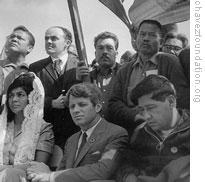


It is within that context that I see/saw the movie. What has been particularly troubling is that those who talk or write about the Chavez movie, almost never mention the conditions of farm workers today. Among these critiques, there is also valid and useful critique that comes from people with no ax to grind, primarily from human rights activists who lived that era or who are engaged in human rights struggles today. Some criticism is from the so-called far left, some of which is simply hypercritical, not necessarily wrong, but seemingly unaware of Chavez’s larger role or value to society. Some of the critique is along the same lines as that of his former enemies, many of whom are from the extreme far right and who always equated him or saw him as an enemy of capitalism and an enemy of the state. Much of that critique comes from professional movie critics who know movies but who know little about Cesar Chavez and the UFW movement and know even less about the condition of farmworkers in this nation’s fields. From reading the many reviews, most of them seem to be formulaic, critiquing the movie as a hero-worshipping biopic, with deeply flawed acting, etc., etc. There appears to be a cottage industry of those who love to critique Cesar Chavez and the United Farm Workers (UFW) Movement, by people who have little first-hand knowledge of the events in question. I did not write a critique of the movie Cesar Chavez when it first premiered because I felt somewhat conflicted, and I didn’t feel like jumping on a bandwagon.


 0 kommentar(er)
0 kommentar(er)
